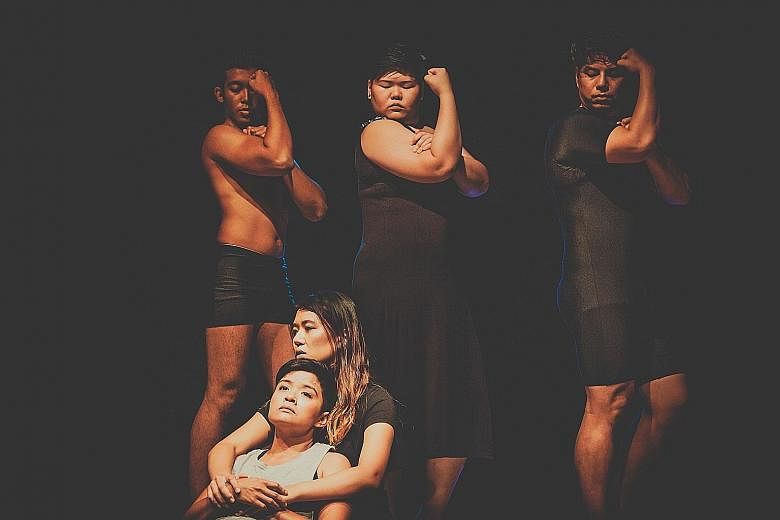REVIEW / THEATRE
PRETTY BUTCH (R18)
Tan Liting
M1 Singapore Fringe Festival
Black Box, Centre 42/Wednesday
In this year's M1 Singapore Fringe Festival, artists are literally revealing more of themselves, thanks to the theme Art & Skin.
Foreign Bodies, last week's burlesque revue by Singaporean troupe Skin In SIN, was about body positivity. Near-nude dancers celebrated the human form with every strut of unashamedly jiggling thighs.
Pretty Butch by playwrightdirector Tan Liting is about body-shaming.
Stripped to their underwear, five actors try on and discard clothing as the audience files in. They climb onto a two-tined runway made of perspex stools (set by Wong Chee Wai) and strut their stuff to a thumping indie rock soundtrack designed by Jing Ng.
Turn by turn, they get into character as people uncomfortable with their own bodies. Deonn Yang is a woman who prefers the comfort of pants and sneakers. She is mistaken for a man trying to muscle into the women's washroom.
Henrik Cheng's character has a condition which makes him gain fat on top. He has to wear a sports bra to achieve a socially acceptable silhouette.
Pretty Butch makes effective use of the Black Box at Centre 42. The audience sits on three sides of the set. Main sketches take place inside the square formed by the runway, while the other performers pose in classic attitudes from fashion shoots or Greek sculpture.
There is always enough going on, and enough obscured, that no single viewer need feel cheated.
The conflict between self and social perceptions drives the play.
Farah Ong and Shannen Tan are a lesbian couple confronting stereotypes about what a family should look like and what the role of a mother is.
Ong's character is carrying their baby, but hates maternity dresses.
Her partner is not entitled to maternity leave.
On holiday, Cheng's character shares a room with the hyper-masculine Fadhil Daud. Fadhil presses out extreme push-ups and boasts about boning chicks, while Cheng gasps through a simple set and pretends his bra belongs to a one-night stand.
Their stumbling friendship is both the least convincing and most intriguing storyline, which needed more time to develop.
Pretty Butch is an affecting collection of unrelated sketches. It could have been more effective by jettisoning Yang's pants-loving character.
Yes, in suit and tie, she embodies the grey area between masculine and feminine, where these characters reside. It is pretty to look at, but not powerful enough.
Subsuming her stories into Ong's would have given the men much-needed time. It would have made it easier to compare the pressure both men and women feel to live up to social ideals, regardless of sexual identity.
• Pretty Butch is sold out.


